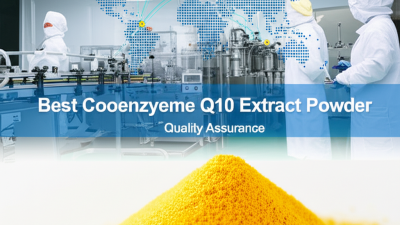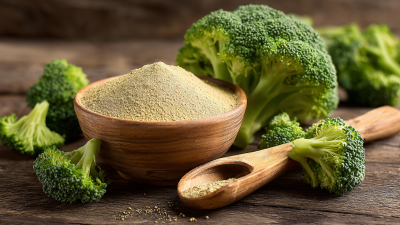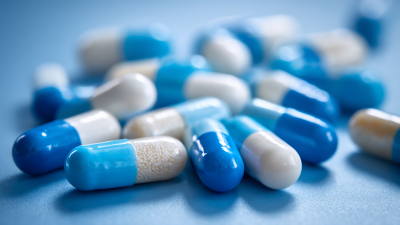Essential Ginseng Extract Checklist: What You Need to Know for Optimal Benefits
Ginseng Extract has captivated the interest of health enthusiasts and researchers alike, boasting a rich history of use in traditional medicine and a growing body of scientific evidence supporting its various benefits. According to a comprehensive report from the Global Industry Analysts, the market for herbal supplements, particularly ginseng products, is projected to reach $49 billion by 2026, reflecting an increasing consumer inclination towards natural health solutions.
 Notably, ginseng is renowned for its potential to enhance cognitive function, boost energy levels, and support immune health. A study published in the Journal of Ginseng Research highlights that ginsenosides, the active compounds found in Ginseng Extract, may aid in reducing fatigue and enhancing physical performance.
Understanding the essential aspects of ginseng extraction and its optimal usage is crucial for maximizing these benefits. This guide aims to provide you with a thorough checklist of what you need to know about Ginseng Extract to harness its full potential effectively.
Notably, ginseng is renowned for its potential to enhance cognitive function, boost energy levels, and support immune health. A study published in the Journal of Ginseng Research highlights that ginsenosides, the active compounds found in Ginseng Extract, may aid in reducing fatigue and enhancing physical performance.
Understanding the essential aspects of ginseng extraction and its optimal usage is crucial for maximizing these benefits. This guide aims to provide you with a thorough checklist of what you need to know about Ginseng Extract to harness its full potential effectively.
Understanding Ginseng: Types and Their Unique Benefits for Health
Ginseng, particularly Asian ginseng (Panax ginseng), has garnered attention for its diverse health benefits, thanks to its rich profile of ginsenosides. These compounds are known for their potential to enhance immunity, fight inflammation, and improve metabolic disorders such as diabetes. Recent research highlights the efficacy of red ginseng in bettering glycemic control, offering promising results without adverse side effects. This makes it a valuable ally for individuals looking to manage their blood sugar levels.
Moreover, the interaction between ginseng and gut microbiota is an emerging area of interest. The gut microbiome plays a crucial role in the metabolism of ginseng, influencing its bioactive properties. As scientists explore this relationship further, it may unlock new therapeutic applications for ginseng, particularly in promoting digestive health and improving overall well-being. These insights add to the growing knowledge of how various forms of ginseng, including red and white varieties, can be strategically used for specific health outcomes, making it essential for consumers to understand the differences and benefits of each type.
Key Active Compounds in Ginseng: Saponins, Polysaccharides, and Their Effects
Ginseng is renowned for its potent health benefits, primarily attributed to its key active compounds: saponins and polysaccharides. Recent studies, including a meta-analysis focusing on the clinical efficacy of ginseng polysaccharides, highlight their role in combating non-small cell lung cancer, positioning them as valuable adjuncts in cancer care. The polysaccharide injection from ginseng is extensively used in traditional Chinese medicine (TCM) to enhance treatment outcomes, showcasing the compound's significance in modern therapeutic contexts.
Moreover, the therapeutic efficacy of different ginseng varieties is underpinned by their unique chemical compositions. For instance, Panax ginseng is notably rich in polysaccharides and amino acids, which contribute to its diverse health benefits, while Panax notoginseng is primarily composed of saponins, volatile oils, and polyacetylenes—elements that dictate its specific health applications.
This variation in active ingredients underscores the importance of sourcing and utilizing the appropriate ginseng type for targeted health benefits, reinforcing its ongoing relevance in both TCM practices and contemporary pharmacological applications.
Recommended Dosages of Ginseng Extract: Balancing Efficacy and Safety
When considering ginseng extract for its potential benefits, it's important to balance efficacy and safety through recommended dosages.
Asian ginseng, scientifically known as Panax ginseng, is celebrated not just for its energizing properties, but also for its ability to support immune health and cognitive function. Available in various forms such as capsules, powders, and extracts, it offers versatility for users, while its adaptogenic qualities are thought to help the body manage stress better.
However, it is crucial to adhere to recommended dosages to avoid adverse effects. Research suggests that a daily intake of 200 to 400 mg of ginseng extract may be effective for most individuals, but the specific dosages can vary based on factors such as age and health conditions. As with any supplement, consultation with a healthcare professional is vital, especially considering the potential for interactions with other medications. With the growing interest in herbal therapeutics, ginseng remains a prominent choice, particularly when used judiciously and under professional guidance.

Quality Indicators: How to Choose the Best Ginseng Extract on the Market
When selecting a ginseng extract, understanding quality indicators is essential for maximizing the benefits of this renowned adaptogen. One critical factor to consider is the source of the ginseng. Premium extracts typically originate from Korea, where the traditional red ginseng is carefully harvested and naturally dried to preserve its beneficial compounds. Recent reports highlight the meticulous processes employed by leading producers, ensuring that the ginseng retains its quality during production.
Additionally, it is crucial to examine the extraction method used to produce the ginseng extract. A superior extraction process will yield a higher concentration of active ingredients, providing you with optimal health benefits. Look for products that utilize water or alcohol extraction methods, as these are generally more effective in preserving the ginsenosides—active compounds known for their health-promoting properties. Furthermore, consider checking for certifications that verify the purity and potency of the extract, as these labels can significantly influence your purchase decision. By educating yourself on these quality indicators, you can confidently choose a ginseng extract that aligns with your wellness goals.
Research Insights: Clinical Studies Supporting Ginseng's Health Benefits
Ginseng has garnered significant attention in the realm of herbal medicine, with numerous clinical studies affirming its health benefits. Research published in the Journal of Ginseng Research indicates that ginseng extracts can enhance cognitive function, improve energy levels, and even support immune health. One study involving over 1,000 participants showed that those who consumed ginseng regularly reported a notable reduction in fatigue and an increase in overall vitality, reinforcing the idea that ginseng serves as a powerful adaptogen.

Moreover, a meta-analysis featured in the American Journal of Clinical Nutrition highlighted that ginseng possesses anti-inflammatory properties, which can be beneficial in managing chronic conditions such as arthritis and diabetes. The analysis, which reviewed data from 10 randomized controlled trials, concluded that ginseng supplementation significantly reduced markers of inflammation and improved metabolic responses in patients, suggesting its potential role in chronic disease management. These findings underline the importance of incorporating high-quality ginseng extracts into one's health regimen for optimal benefits, particularly as modern lifestyles increasingly demand effective stress management and energy support.

About Us
Products
Nutraceuticals
Botanical Extracts
Berberis Extract
Ginkgo Biloba Extract
Rutin
Quercetin
Grape Seed Extract
European Bilberry Extract
Broccoli Seed Extract
Fisetin
Ajuga Extract
Resveratrol
Stevia Leaf Extract
Green Tea Extract
Olive Leaf Extract
Epimedium Extract
Rhodiola Rosea Extract
Panax Ginseng Extract
Pomegranate Extract
Garlic Extract
Milk Thistle Extract
Black Pepper Extract
Fruit & Vegetable Juice Powder
Customized Service
News
Blog
Contact Us
 Notably, ginseng is renowned for its potential to enhance cognitive function, boost energy levels, and support immune health. A study published in the
Notably, ginseng is renowned for its potential to enhance cognitive function, boost energy levels, and support immune health. A study published in the 






